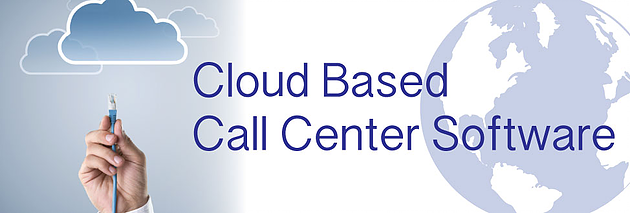In today’s customer-centric competitive environment, your call center plays a vital role in shaping the image of your business. The way you set up, operate and manage a call center can directly affect the speed, reliability, and effectiveness of your business operations.
In the past, most businesses have relied on on-premise call centers. But that is changing rapidly. More and more companies are moving towards cloud hosted call centers. The reason for the move will be evident from the discussion below. But first, let’s find out what on-premise and cloud call center systems entail:
• On-Premise Call Centers: In an on-premise call center, you buy the software, hardware and infrastructure equipment, put it all together on your premise and maintain it. The upside of this process is that you have total control of your overall system. The downside is that you are responsible for upgrades, security, and maintenance.
• Cloud Call Centers: When you use a cloud call center, you generally use the services of a third-party vendor who hosts all the software, hardware and infrastructure for you on the cloud. The service provider is responsible for maintaining the infrastructure. You use the call center system as a service.
Comparing On-Premise and Cloud Call Center Systems
Before we start the discussion, it is important to understand that cloud based solutions have many advantages over on-premise solutions. Understanding the subtleties of those advantages will help you choose the right cloud based solution for your business.

Cost of Ownership
On-Premise: On-premise call center requires an upfront investment in software and hardware. It requires trained experts to set up the servers and phone line systems. The system requires testing before going live. Once the system is running, you will bear the cost of software updates and hardware failures. It is expensive to start an on-premise solution from scratch.
Cloud: In a hosted solution, you will pay the third-party who will be responsible for the software and hardware. It means you don’t have any startup cost. You can start using a cloud based system without making a huge investment. If a particular system doesn’t meet your needs, you can move on to a different vendor. It lowers your cost of ownership.
Setup Time
On-Premise: On-premise call center systems are complicated. Every vendor has their own specifications. You have to get all the right software and equipment before you can start. Depending on the size of your operation, setting up an on-premise call center can take a few weeks to a few months.
Cloud: Cloud-hosted solutions allow you to connect to the servers using the internet and simple client applications. It means you can use generic microphones and headsets to get started. You can order custom phones if you want but it is not necessary. It can cut-down setup times dramatically.
Infrastructure Maintenance
On-Premise: As an owner of the system, you are responsible for every component. You can buy premium support from your vendor. But it can be expensive. Even with vendor support, you still have to manage and coordinate with your IT team to ensure the operation is running smoothly. With a growing business, the responsibilities of handling a live infrastructure can become overwhelming. Hiring more IT support can add to the expenses.
Cloud: In a cloud hosted call center system, you are free from the responsibilities of maintenance. The third-party service providers will take care of the infrastructure issues. They are experts at providing better support because it is their core business.
 Investment Flexibility
Investment Flexibility
On-Premise: You will need to plan your on-premise expansion. There is little chance for scaling down. You can rent equipment to keep your costs down. But even with rental contracts, you need to plan ahead of time to keep within your budget. It is difficult to quickly change your strategy with fast-moving markets.
Cloud: Cloud solutions are generally more flexible in terms of contracts. If your business requires more bandwidth during the holiday seasons, you can plan ahead and prepare accordingly. But if a sudden opportunity arises, like an off-season fashion fad or a certain game team winning, you can get more bandwidth easily to serve those peak business opportunities.
Feature and Security Updates
On-Premise: On-premise systems give you control over your software and servers. You have control over what features and security patches you install. But installing new features and patches have risk associated with them. Also, the installations require time and resources. So new features or security updates often get postponed. It can result in vulnerabilities.
Cloud: The cloud was initially considered unsafe for sensitive information. The strength of security around cloud technology has improved significantly. Due to constant vigilance and the latest technology at work, today your data is safer in a cloud environment than an on-premise system.

Disaster Recovery and Reliability
On-Premise: Natural disasters and other occurrences can take a premise off the grid. If your premise is unreachable, there isn’t much you can do. Your business has to deal with the loss of productivity.
Cloud: Cloud-based systems come with built-in redundancy making them more reliable. Of course, check with your service provider to make sure the cloud-based system has the necessary redundancy in place to serve you during a disaster situation.
Geographical Collaboration
On-Premise: Due to cost and time concerns, it is not easy to move your on-premise infrastructure. This can impede taking advantage of working with new teams in a different location or using the surplus of the current team.
Cloud: Hosted call centers give you the ability to build collaboration across multiple locations. Your business can allocate surplus human resources to different locations dynamically. It helps you build teams across the globe.
At Converged Solutions, we are experts in call center systems. We recommend cloud based systems due to the obvious advantages in cost, time, reliability, and security. If you have questions, please feel free to contact us. Our team of experts is ready to help you find a great solution that is right for your business.
 Skip to navigation
Skip to content
Skip to navigation
Skip to content

